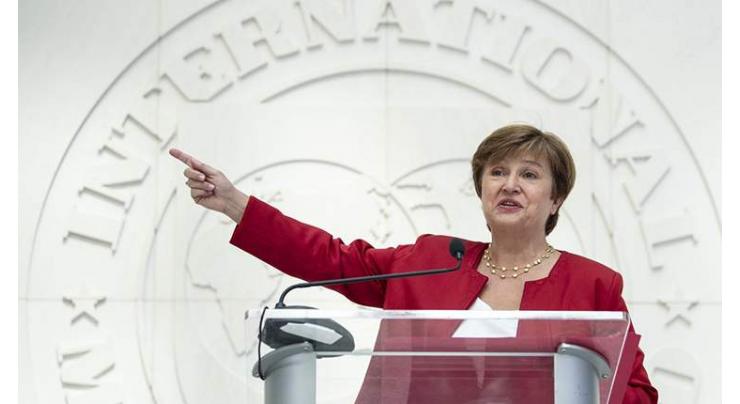
G20 Must Avoid 'Great Divergence,' Boost Global Vaccine Supply - IMF Managing Director
Muhammad Irfan Published February 24, 2021 | 08:34 PM

The Group of 20 countries (G20) must avoid a dangerous divergence in their ranks and step up the coronavirus vaccine supply across the world to shield vulnerable economies from untold risks, International Monetary Fund (IMF) Managing Director Kristalina Georgieva said on Wednesday
WASHINGTON (UrduPoint News / Sputnik - 24th February, 2021) The Group of 20 countries (G20) must avoid a dangerous divergence in their ranks and step up the coronavirus vaccine supply across the world to shield vulnerable economies from untold risks, International Monetary Fund (IMF) Managing Director Kristalina Georgieva said on Wednesday.
"Most of the world is facing a slow rollout of vaccines even as new virus mutations are spreading and the prospects for recovery are diverging dangerously across countries and regions," Georgieva wrote in an IMF blog. "Indeed, the global economy is at a fork in the road. The question is: will policymakers take action to prevent this Great Divergence? There is a major risk that most developing countries will languish for years to come."
Georgieva said cumulative per capita income by the end of 2022 will be 13 percent below pre-crisis projections in advanced economies compared with 18 percent for low-income countries and 22 percent for emerging and developing countries excluding China.
The projected hit to per capita income will increase by millions the number of extremely poor people in the developing world, she said.
"In other words, the convergence between countries can no longer be taken for granted. Before the crisis, we forecast that income gaps between advanced economies and 110 emerging and developing countries would narrow over 2020-22. But we now estimate that only 52 economies will be catching up during that period, while 58 are set to fall behind," Georgieva said.
The IMF Managing Director explained one reason for this would be the uneven access to coronavirus vaccines.
"Even in the best-case scenario, most developing economies are expected to reach widespread vaccine coverage only by end-2022 or beyond. Some are especially exposed to hard-hit sectors such as tourism and oil exports, and most of them are held back by the limited room in their budgets," Georgieva said.
The IMF chief also noted that the coronavirus pandemic will not end "until it is over everywhere."
"While new infections worldwide have recently declined, we are concerned that multiple rounds of vaccinations may be needed to preserve immunity against new variants. That is why we need much stronger international collaboration to accelerate the vaccine rollout in poorer countries," Georgieva said.
Additional financing to secure doses and to pay for logistics is critical and so is the timely reallocation of excess vaccines from surplus to deficit countries, she also said.
A significant scaling up of vaccine production capacity for 2022 and beyond and insuring vaccine producers against the downside risks of overproduction may be an option worth considering, Georgieva added.
The economic arguments for coordinated action are overwhelming given that faster progress in ending the health crisis could raise global income cumulatively by $9 trillion over 2020-25 - beating by far any measure of vaccine-related costs, according to Georgieva.
Recent Stories

Tennis: ATP Barcelona Open results - 1st update

Swiatek's perfect 10 in Stuttgart as Vondrousova stuns Sabalenka

Arandu's roads closed due to flooding

Oil tanker catches fire in Islamabad’s Blue Area

Pakistan committed to ensure safety of foreign nationals: FO

Tennis: WTA Stuttgart results - 1st update

Four passengers injured as train hit an empty vehicle

Over- speeding bus crushed to death two bike riders

Turkey's Freedom Flotilla ready to set sail for Gaza

French teen dies from heart failure after knife attack near school

Iranians appear unfazed by Isfahan blasts

UAF celebrates Int'l Chinese Language Day
More Stories From World
-
Togo lawmakers approve contested political reform
2 hours ago -
NATO must choose 'whether we indeed are allies': Zelensky
2 hours ago -
US House to vote on Ukraine, Israel, Taiwan aid package
2 hours ago -
Calls for calm after reported Israeli strike on Iran
3 hours ago -
IMF calls on EU to deepen single market integration to boost growth
3 hours ago -
Second Ecuadoran mayor killed ahead of anti-crime referendum: police
3 hours ago
-
Oil, gas drilling blocked in Alaska wilds as Biden seeks green cred
4 hours ago -
Man sets self on fire outside Trump trial
4 hours ago -

Turkey's Freedom Flotilla ready to set sail for Gaza
5 hours ago -

French teen dies from heart failure after knife attack near school
5 hours ago -

Iranians appear unfazed by Isfahan blasts
5 hours ago -

Ecuador mayor killed ahead of anti-crime referendum: police
5 hours ago



